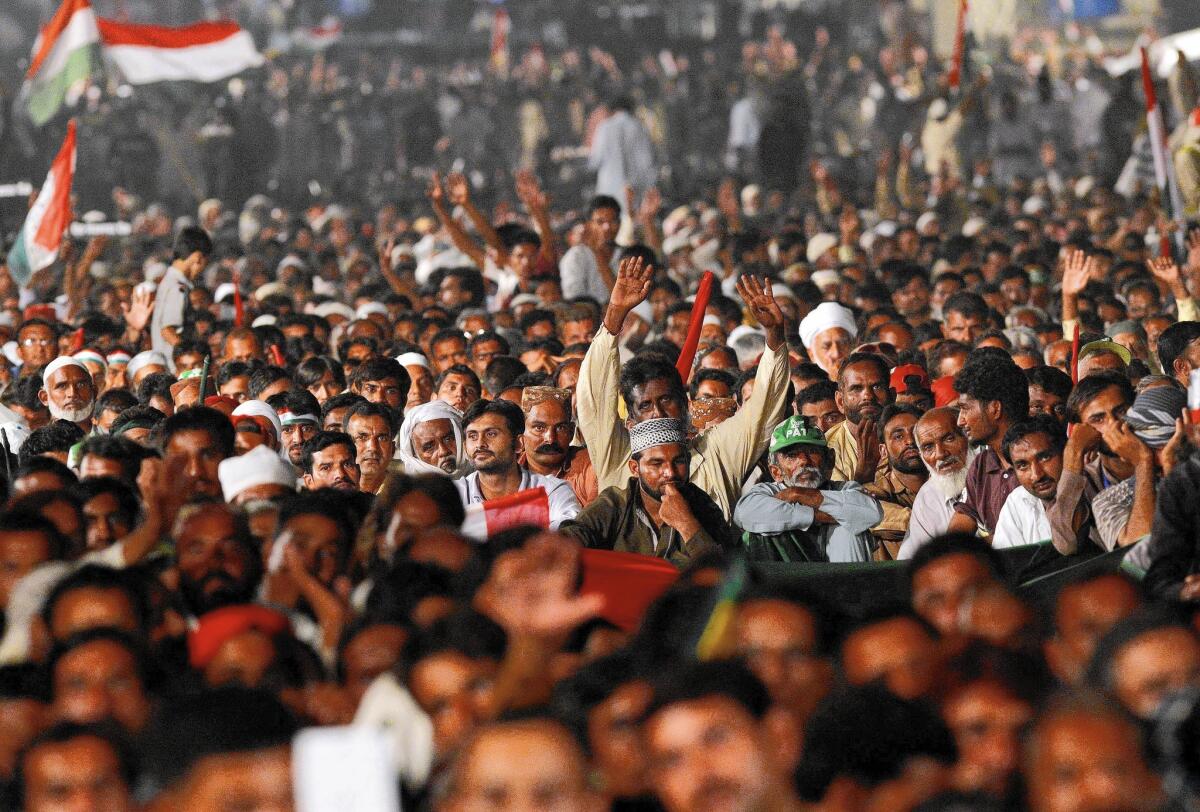In Pakistan, some antigovernment protesters just want to go home

- Share via
Reporting from Islamabad, Pakistan — A month ago, Shabbir Ahmed was excited when he and 20 coworkers were ordered by their boss to join antigovernment demonstrations in the heart of this capital. The 25-year-old laborer from the eastern metropolis of Lahore had never been to Islamabad before.
But the enthusiasm has worn thin as the protests, which at first seemed on the verge of toppling Prime Minister Nawaz Sharif, enter their second month with little sign of political change. The now far-smaller protest camp in Islamabad’s once-pristine government district has become a sprawling, trash-strewn tent city, barricaded to keep out police.
Many of the few thousand still here, mainly working-class men, say they are under orders from protest leaders or politically connected bosses who have provided their families with cash or threatened to fire them if they return home now.
That has contributed to a growing sense of frustration among the demonstrators and underscored Pakistan’s ever-dysfunctional politics, even as leaders of the protest continue to make daily speeches that are broadcast nationwide by domestic TV channels.
“Sometimes it feels as if we are imprisoned here,” said Ahmed, who wants to return to Lahore. “But we cannot leave the sit-in, as police could arrest us, and we cannot go to our homes, because we will lose our jobs.”
Ahmed works at a brick kiln owned by a member of the political party of Imran Khan, a politician and former cricket star who has helped lead the protests calling for Sharif’s resignation. Khan, holding court in a shipping container near the parliament building, has alleged widespread fraud in last year’s election, which marked the first democratic transfer of power in Pakistan’s 67-year history.
Sheepishly, Ahmed said he knew little about Khan’s politics. But the kiln owner, Khalid Gujjar, pays Ahmed’s family $15 to $20 a week while he is away, the worker said.
In the evenings, when Khan emerges from the container to address the crowd, the camp grows as more supporters arrive. The mood temporarily brightens, especially for young men who have little to do during the day except play cricket and doze in the heat.
“The evening is the best time, when the beautiful girls come to hear Khan’s speech,” said Ahmed’s friend, Ayyaz Ahmed, 18.
Yet even here, many believe the protests will change little. Demonstrators attempted to march on Sharif’s official residence at one point, prompting a police crackdown that left three dead. The prime minister has refused to resign, and Khan has said he won’t call off the sit-in.
Over the weekend, security forces reportedly arrested hundreds of opposition activists around Islamabad. Khan and another protest leader, moderate cleric Tahirul Qadri, in turn announced that they were calling off negotiations with Sharif’s government.
Analysts say the standoff has brought Pakistan’s fractious political system to a standstill. Whereas Sharif is often accused of being weak and ineffective, Khan has been criticized for his all-or-nothing insistence on new elections when few believe that voting irregularities were widespread enough to overturn the comfortable victory margin of Sharif’s party.
“The larger frustration that is directed at both parties in this conflict — the protesters and the government — is that the entire business of the state, the whole national conversation, is basically paralyzed,” said Mosharraf Zaidi, a columnist and former Pakistani diplomat.
“Nobody thinks [the protests] are actually going to change very much, because the two maximalist positions on both sides are in such stark contradiction to one another,” he said.
Qadri, a populist preacher who runs a large network of schools, has railed against Sharif’s economic policies, which he says have exacerbated poverty. But government officials dismiss him as a firebrand who has paid off many of his supporters or forced his employees to attend the sit-in.
A woman from the city of Haripur, 25 miles from Islamabad, said she and two relatives were promised $4 a day when they arrived Aug. 14. When the revolution was achieved, she was told, her family would get a house.
But many other women have returned home, citing the lack of sanitation in the camp, where the smell of human waste emanates, and the difficulty of looking after children, said the woman, who did not want to be identified criticizing Qadri.
Mohammed Rashid, a 28-year-old cook from Haripur, joined Qadri’s march despite having backed Sharif’s party in the last election. Since last year, Khan’s party has led the government in Khyber-Pakhtunkhwa province, where Rashid lives, but, he said, people have seen little improvement in their lives.
Rashid did not acknowledge receiving money to protest. But others around him said he had.
“Sometimes it feels as if we are being exploited by these leaders,” Rashid said. “My father makes me call almost every day and asks me to come back. I miss my family, but the peer pressure stops me” from leaving, he said.
Qadri’s followers, who are more numerous and organized than Khan’s, guard the protest site with nail-studded clubs, inspecting cars and frisking entrants. Police officers have been harassed and beaten by protesters, contributing to a sense of deteriorating law and order.
Some observers say Khan and Qadri have stirred anger among their followers that could be difficult to contain. This week, authorities accused Khan of interfering in police work after he stopped the arrests of 15 of his supporters who had clashed with officers.
“The majority of participants are young people, and they have been learning to challenge the writ of the state,” said Abdul Shakoor Khan, a journalist who has been covering the protests. “They are not afraid of the police. This is going to be dangerous.”
Special correspondent Sahi reported from Islamabad and Times staff writer Bengali from Mumbai, India.
More to Read
Sign up for Essential California
The most important California stories and recommendations in your inbox every morning.
You may occasionally receive promotional content from the Los Angeles Times.














